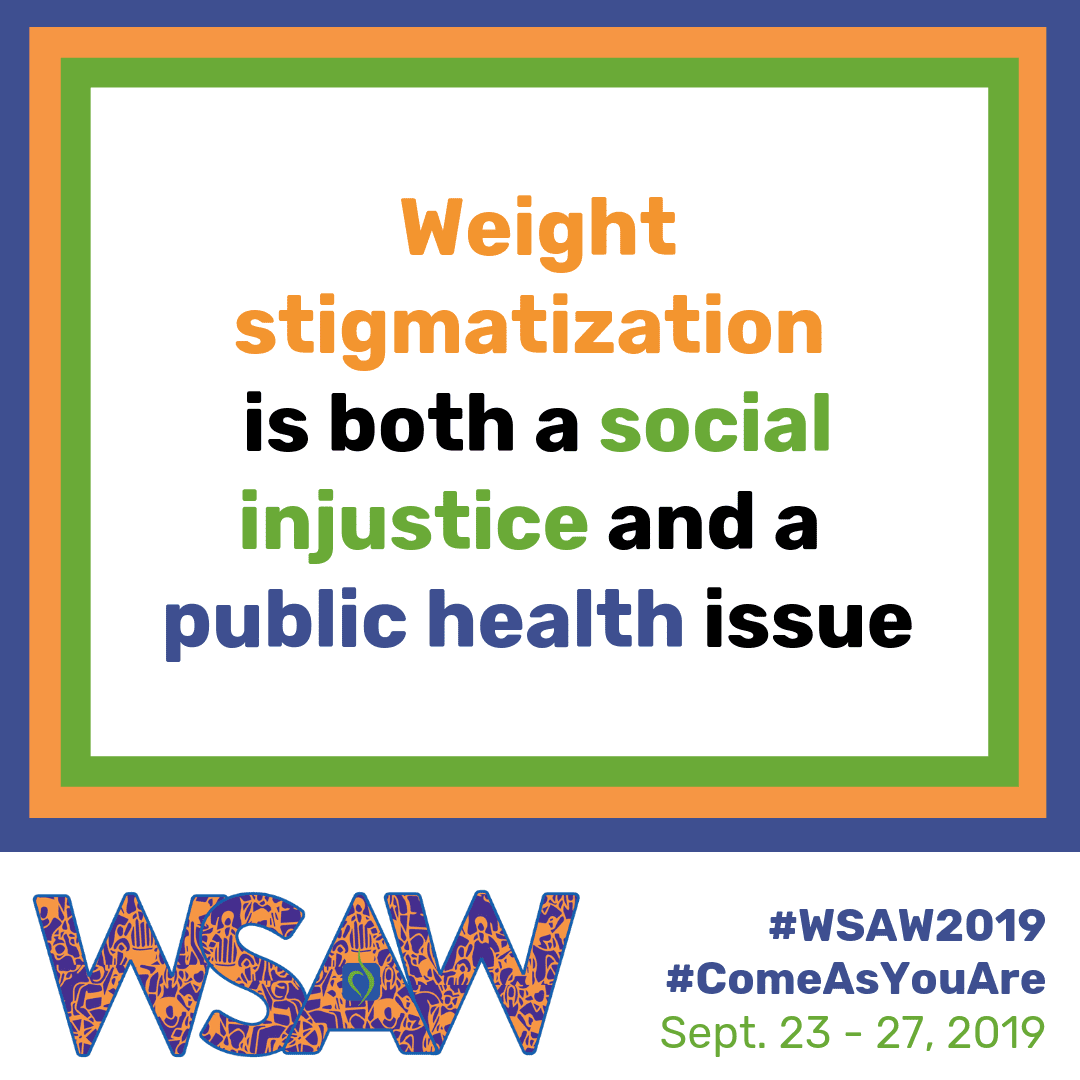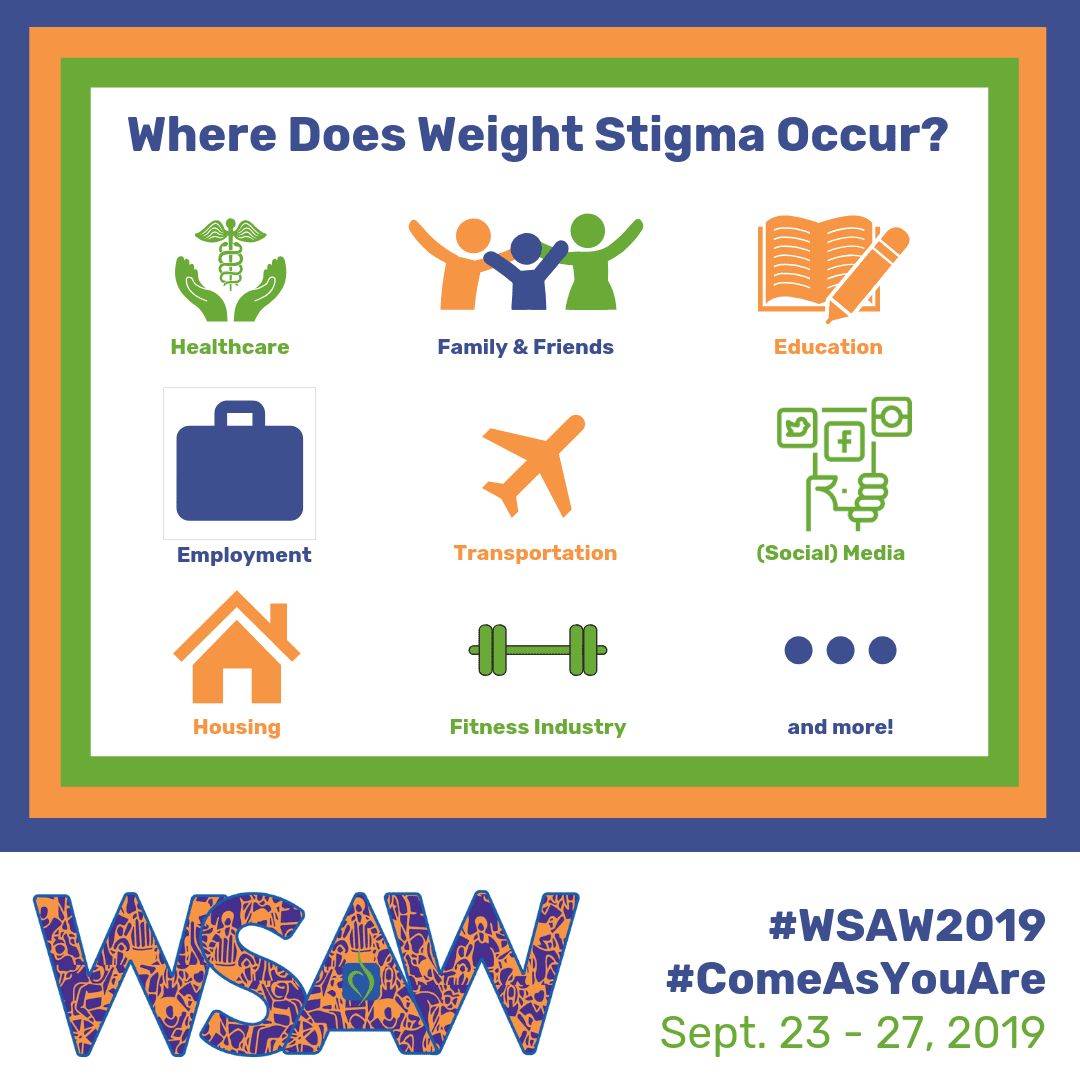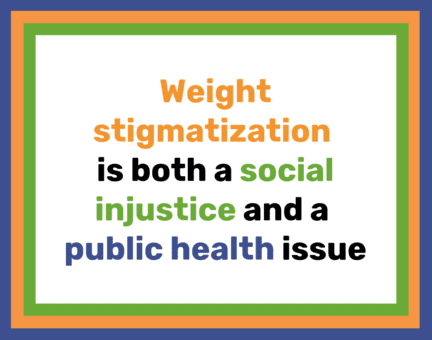The National Eating Disorder Association (NEDA) is hosting its first annual Weight Stigma Awareness Week (#WSAW2019) the week of September 23-27, 2019. Weight Stigma Awareness Week was started by the Binge Eating Disorder Association (BEDA), which merged with NEDA last fall.
This naturally leads to a few questions. For example, what is weight stigma? What are the effects of weight stigma? How are people in larger bodies impacted by weight stigma? What about people in smaller bodies? Let’s take a closer look at why weight stigma impacts everyone, and why we should work to end weight stigma.
What Is Weight Stigma?
Weight stigma is also known as weight bias, weight-based discrimination, and fatphobia. Regardless of the name, they all mean the same thing: experiencing discrimination, stereotyping, and false assumptions because of one’s body size.

Courtesy of NEDA
Weight stigma can be external or internal. For example, if a person in a larger body goes to a doctor for a medical complaint and is told to “lose weight” without a thorough exam, diagnostic testing or discussion of symptoms, that is a form of weight stigma. Comments from family and friends, even ones that “mean well,” can also be a form of weight stigma. Overt bullying comments about size, whether in person or via social media, are also forms of external weight stigma. Being passed over for a promotion due to size, despite good job performance, is another form of external weight stigma.
Internalized weight stigma is when people internalize this bias. For example, one negative stereotype of people in higher-weight bodies is that we’re lazy. If we’re tired, we may use negative self-talk against ourselves instead of engaging in needed self-care or seeking a medical reason for our fatigue, such as low vitamin D or anemia.
What Are the Effects of Weight Stigma on People in Larger Bodies?
The effects of weight stigma are real. Weight stigma impacts people in higher-weight bodies in several ways, including:
- Physically. According to the UConn Rudd Center, Weight stigma can lead to higher blood pressure, increased stress, and not getting medical screenings, which makes it difficult to detect potential health conditions early.
- Medical bias. According to a 2015 review of studies, “many healthcare providers hold strong negative attitudes and stereotypes” toward people in larger bodies. People in larger bodies are more likely to have their health concerns dismissed or blamed on weight, regardless of the circumstance. According to the review, doctors spend 25% less time with patients in larger bodies and they fail to refer patients for diagnostic testing or to consider alternatives for treatment other than advising the patient to lose weight.
- Psychologically. Those of us who experience weight stigma are more likely to be depressed, experience anxiety, have low self-esteem, and struggle with body image.
- Career opportunities. According to a review published in 2015 of multiple studies on weight bias in the workplace, people in higher-weight bodies, and people who are perceived as women in particular, face hurdles at every step of the employment process. They are less likely to be hired and, once hired, have fewer employment opportunities.
- Academic opportunities. Children in higher-weight bodies also experience weight stigma in the form of bullying. Bullying has a negative impact on children and teens, including depression, anxiety, and decreased academic achievement, according to stopbullying.gov. According to a study by Puhl, 3 in 5 children in higher-weight bodies experiences bullying. Teachers and other school workers also hold negative beliefs about children in larger bodies, with more than 20% perceiving these children as more emotional, less likely to succeed at work, having challenging personalities, being less tidy and having more family problems, according to a 1999 study.
- Disordered eating. Those who experience weight stigma are more likely to engage in binge eating, are more likely to have eating disorder symptoms, and are more likely to be diagnosed with binge eating disorder.
- Poor media portrayals. From shows like “The Biggest Loser’ (which is getting a reboot) to news articles to Friends, people in larger bodies are stigmatized and played for laughs. According to the UConn Rudd Center, people in larger bodies have portrayed as unattractive, lazy, and unpopular. These characters are often the target of jokes and teasing. News media often shows stigmatizing photos and videos that show people in higher-weight bodies from unflattering angles or just from their shoulders down, which is depersonalizing.
With our culture’s emphasis on smaller bodies and the constant campaigns against “obesity” (which, for the record, is a stigmatizing word for people in higher-weight bodies), weight stigma has increased by 66% over the last decade according to The Stigma of Obesity: A Review and Update by Rebecca M. Puhl. This is despite clear, scientific evidence that weight stigma is harmful.

Courtesy of NEDA
How Does Weight Stigma Impact People in Smaller Bodies?
Weight stigma hurts everyone. One of the biggest predictors of developing an eating disorder is dieting. Many people in smaller bodies feel pressured to diet because they don’t have the bodies that are held up as ideal by the media. Weight stigma also impacts people recovering from eating disorders, as recovery often results in a change in body size, and potential weight gain can be terrifying in light of how our culture treats people in larger bodies. People in bodies of every size waste time and money pursuing the “ideal” body, instead of recognizing that our bodies are good, just as they are.
How Can We End Weight Stigma?
Ending weight stigma begins with questioning our culture. Why is one body size, and one that is difficult for many of us to attain, held up as the ideal? Why are so many people biased against fat people (I’m using fat as a neutral descriptor, not as a negative, and a term I use to describe myself)? Where did the idea that fat people are lazy or noncompliant come from?
These ideas are often a result of alarmist articles and news segments about the “obesity epidemic” and media portrayals. It’s essential to call out this bias when we see it in the media and on news shows.
We can also help end weight stigma by ensuring spaces are accessible for people of all sizes. For example, the next time you’re at your doctor’s office, a concert, or at your favorite restaurant, consider whether the seating could accommodate someone in a larger body. If it wouldn’t, say something. Inaccessible spaces keep people in higher-weight bodies from fully participating in society, and we deserve a seat at the table, just like everyone else.
A great step toward ending weight stigma is by participating in Weight Stigma Awareness Week from September 23-27. Consider participating in the conversation on social media by using the hashtags #WSAW2019 and #ComeAsYouAre. Let’s work together to end weight stigma and discrimination.
Melinda Sineriz is a freelance writer and fat acceptance advocate. Read more of her thoughts on Twitter or visit her website to learn more.
